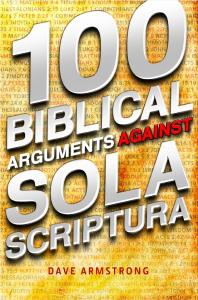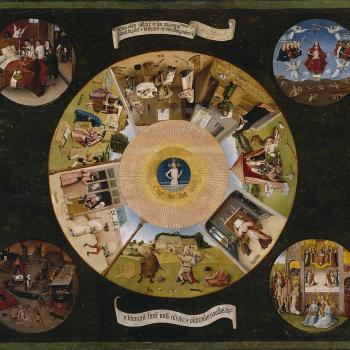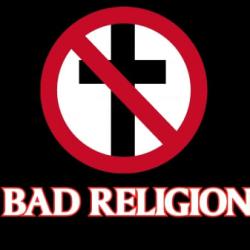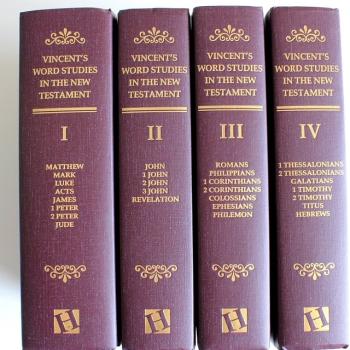[book and purchase information]
This is a classic apologetics issue between Catholics and Orthodox on one side, and Protestants on the other, and one, I submit, that Protestants have not sufficiently answered, and, indeed, cannot answer. It’s a fatal objection to their position. Let me run through the logic of this devastating critique of sola Scriptura:
1) The question of sola Scriptura has to do with the rule of faith, which is the method by which Christians can know with certainty, or infallibly, what is true and what is not, in terms of Christian doctrine.
2) Sola Scriptura is the Protestant rule of faith. Its definition, taken from its most able defenders, is: “Scripture is the only infallible source and norm of Christian doctrine.” The consequence of this definition is that the Church and Sacred Tradition are not infallible, as they are in the Catholic “three-legged stool” rule of faith.
3) The whole point of a rule of faith is the attainment of infallible knowledge. Failing that, it logically reduces to a mere fallible “tradition of men”: in which case, no one is bound to it, since it has no divine guarantee of truthfulness.
4) Thus, in order to maintain the infallibility of the principle, it follows inevitably that the proofs for it must come from that same source: the Bible, which is alone infallible. They can be explicit or implicit or by deduction, but they must come from the Bible.
5) If sola Scriptura isn’t demonstrated from the Bible, it is self-refuting, because it would entail a non-infallible expression of a principle that is by its very nature, uniquely infallible. In other words, a tradition of men, not demonstrated from Scripture, is by nature, fallible.
6) Ergo: if sola Scriptura isn’t demonstrated from the Bible, it cannot possibly be the Christian rule of faith, and it is false altogether, as all viciously self-refuting propositions are.
Now having stated the Catholic argument that sola Scriptura is self-defeating, self-refuting, or logically viciously circular, let’s see how Steve Hays objected to this reasoning, in his article, “Is sola Scriptura self-refuting?” (1-15-10). His words will be in blue.
***
1. It’s become increasingly popular for Catholic apologists to counter sola Scriptura by claiming that sola Scriptura is self-refuting. For example, Francis Beckwith has been touting this objection at every available venue.
2. Their objection goes as follows:
Unless Scripture teaches sola Scriptura, then sola Scriptura is self-refuting.
3. Now, there are different ways of fielding this objection. For example, Scripture could implicitly teach sola Scriptura even if it didn’t explicitly teach sola Scriptura.
I have already granted that above, since it is potentially the case with all doctrines. For example, infant baptism — by far the most common Christian position now and throughout history — is technically implicitly biblical (though I would say the cumulative case is very strong).
4. However, I’d like to address the objection on its own grounds. The objection seems to be a special case of a more general argument:
A rule of faith is self-refuting unless the rule of faith is self-referential.
In other words, a rule of faith must include itself, and in order to do so it must designate itself as the rule of faith.
That’s not exactly the critique we are making. We’re saying that a rule of faith that purports to be infallible (in practical terms, “certain”), cannot be asserted via an intrinsically fallible (i.e., non-biblical) argument. It’s analogous to the very strong Catholic argument against the Protestant conception of the canon of the books of the Bible. As the late Presbyterian Bible scholar R. C. Sproul admitted, the Protestant canon is a “fallible collection of infallible books.”
That’s not good enough. The foundation of something cannot be weaker than that which it supposedly upholds. Here we have the logical impossibility of a non-biblical, fallible principle — literally, what the Bible calls a “tradition of men” — being applied as the overarching rule of faith with regard to its central aspect: the infallible, inspired Bible, God’s revelation to man.
5. Despite its facile, sales-worthy appeal, it isn’t clear to me that this is logically sound. I think its true that a rule of faith is self-inclusive. But it isn’t obvious to me that a rule of faith must also be self-referential.
For that’s not the rule of faith in itself. That isn’t built into the very nature or intrinsic definition of the rule.
It is in this instance, because if Scripture is the only infallible rule of faith and doctrine, then this notion must necessarily also be included in this Scripture, so as to avoid a logical “foundation of sand.” A strong chain with one weak link can still fail.
Rather, that’s a statement about the rule of faith. That’s a convenient way to identify the rule of faith.
But a statement about the rule of faith is not, itself, the rule of faith–although it’s possible for the rule of faith to make a statement about itself. A statement about the rule of faith can obviously come from the outside. It can also come from the within, but that isn’t inherent in what makes it a rule of faith, that I can see.
That’s neither here nor there. What we’re discussing is the stated Protestant rule of faith. Here are three statements of it, from leading Protestant apologists:
What Protestants mean by sola scriptura is that the Bible alone is the infallible written authority for faith and morals. (Evangelical Protestant apologist Norman Geisler: Roman Catholics and Evangelicals: Agreements and Differences, Grand Rapids, Michigan: Baker Books, 1995, 178; co-author, Ralph E. Mackenzie)
The doctrine of sola scriptura, simply stated, is that the Scriptures alone are sufficient to function as the regula fidei, the infallible rule of faith for the Church. (Reformed Baptist apologist James R. White: The Roman Catholic Controversy, Minneapolis: Bethany House Publishers, 1996, 59)
Scripture . . . is the only inspired and inherently infallible norm, and therefore Scripture is the only final authoritative norm. (Reformed Protestant Keith A. Mathison: The Shape of Sola Scriptura, Moscow, Idaho: Canon Press, 2001, 260)
For example, consider the need to standardize weights and measures. The BIPM issues the International System of Units. Yet it would be fallacious to say the units are self-refuting unless they refer back to the BIPM.
That’s not analogous to the topic at hand, and there is no inherent self-contradiction there.
Therefore, I think the objection is fallacious. But let’s assume, for the sake of argument, that it’s sound.
6. To reiterate the principle:
A rule of faith is self-refuting unless the rule of faith is self-referential.
That’s not the argument we make, as shown above.
Now, Catholics sometimes try to prooftext their rule of faith by appeal to certain Biblical or patristic statements.
7. However, there is also a popular, a priori argument for the Catholic rule of faith. Let’s take a classic statement of this argument:
Surely, then, if the revelations and lessons in Scripture are addressed to us personally and practically, the presence among us of a formal judge and standing expositor of its words, is imperative. It is antecedently unreasonable to suppose that a book so complex, so systematic, in parts so obscure, the outcome of so many minds, times, and places, should be given us from above without the safeguard of some authority; as if it could possibly, from the nature of the case, interpret itself. Its inspiration does but guarantee its truth, not its interpretation. How are private readers satisfactorily to distinguish what is didactic and what is historical, what is fact and what is vision, what is allegorical and what is literal, what is idiomatic and what is grammatical, what is enunciated formally and what occurs obiter, what is only of temporary and what is of lasting obligation? Such is our natural anticipation, and it is only too exactly justified in the events of the last three centuries, in the many countries where private judgment on the text of Scripture has prevailed. The gift of inspiration requires as its complement the gift of infallibility.
Where then is this gift lodged, which is so necessary for the due use of the written word of God? Thus we are introduced to the second dogma in respect to Holy Scripture taught by the Catholic religion. The first is that Scripture is inspired, the second that the Church is the infallible interpreter of that inspiration. [St. John Henry Cardinal Newman; source]
First of all, this isn’t the topic. The topic is not, “what is the Catholic rule of faith?” It’s (as in Steve’s own title), “Is sola Scriptura self-refuting?” He doesn’t resolve that conundrum one whit in switching the topic over to Catholic views. That’s what we call in logic a non sequitur. But those with poor arguments have utilized this pathetic method of switching the topic, for centuries. Cardinal Newman was not even (arguably) discussing the rule of faith. He was talking about perspicuity of Scripture, and authoritative interpretation of it.
Not only is that how Newman argues, but [Michael] Liccione, for one, also uses the same type of argument.
According to this form of the argument, you don’t really need to have the Catholic rule of faith asserted in Scripture or tradition. Rather, the Catholic rule of faith is treated like a necessary precondition or presupposition or self-evident truth-condition.
We should accept the Catholic rule of faith simply because the consequences of the Protestant alternative are unacceptable. So its status is axiomatic. A first principle.
Nonsense. As stated, this is an off-topic obfuscation, but briefly stated, the Catholic rule of faith is not circular and is grounded in Holy Scripture every step of the way.
8. Yet that invites a comparison. For if the Protestant rule of faith is self-refuting unless it is self-referential, then why isn’t the Catholic rule of faith self-refuting unless it is self-referential?
We contend that Scripture itself teaches that Church and Sacred Apostolic Tradition are also infallible, alongside Holy Scripture. It’s self-consistent because the whole thing can be deduced from inspired, infallible Scripture, whereas sola Scriptura cannot do so, since it fundamentally replies on a non-biblical principle which is then arbitrarily applied to the Bible.
Conversely, if the Catholic rule of faith can be treated as simply axiomatic, then why can’t the Protestant rule of faith be treated as simply axiomatic? If an a priori type of argument is sufficient for the Catholic rule of faith, then why can’t the same reasoning be applicable to the Protestant rule of faith?
I reject this claim about our rule of faith. It’s not “simply axiomatic.” It is explicitly grounded in Holy Scripture, which all parties accept as inspired revelation (on many other grounds, and in faith). Note what Steve has again done. He has not sought to overcome the extreme logical difficulty of his own position. Instead, he switches the topic over to Catholicism, falsely describes our view (a straw man), and then chides us by arguing, in effect, “why can’t we do the same thing you do?” Apart from the silly straw man, this isn’t any defense whatsoever of his own position. In fact, the adoption of these unworthy tactics of non sequitur and sophistical argumentation precisely prove that Steve isn’t confident in his own position, since he resolutely refuses to defend it.
And he acts that way because — I contend — he cannot do so. Not only him, but any Protestant, cannot defend sola Scriptura against this fatal charge. I think they know this down deep, which is why they always seek to switch the topic, in order to supposedly get off the “hot seat.” That doesn’t work with me (someone who has been doing Catholic apologetics for over thirty years: the last twenty professionally). I will expose it for what it is every time.
9. Is it just because the Protestant rule of faith contains the word “only,” whereas the Catholic rule of faith does not? But that’s a superficial, semantic difference–depending on how your verbally formulate the respective positions.
No it isn’t. It’s about the issues I raise above.
Yet Catholics also regard their rule of faith as the only true rule of faith, so there’s no material difference in terms of exclusivity.
From what I can tell, the Catholic objection is nothing more than a muddleheaded, verbal trick.
That’s absurd. But if it were true, then Steve ought to be able to decisively refute it. He hasn’t even tried to begin doing so. He hasn’t shown how sola Scriptura is not self-refuting. He hasn’t even made it to first base.
[now, a few comments from the combox]
Produce a definition of SS from a Reformed confession or representative Reformed theologian . . .
I did: Keith Mathison [Reformed Presbyterian] and Steve’s buddy James White [Reformed Baptist]. Both state definitions that can easily be squared with Reformed Confessions, if needs be. For example, the Belgic Confession:
7: The Sufficiency of the Holy Scriptures to Be the Only Rule of Faith
We believe that those Holy Scriptures fully contain the will of God, and that whatsoever man ought to believe unto salvation is sufficiently taught therein. For, since the whole manner of worship which God requires of us is written in them at large, it is unlawful for any one, though an apostle, to teach otherwise than we are now taught in the Holy Scriptures; nay, though it were an angel from heaven, as the apostle Paul saith. For, since it is forbidden to add unto or take away any thing from the Word of God, it doth thereby evidently appear that the doctrine thereof is most perfect and complete in all respects.
Neither do we consider of equal value any writing of men, however holy these men may have been, with those divine Scriptures, nor ought we to consider custom, or the great multitude, or antiquity, or succession of times and persons, or councils, decrees, or statutes, as of equal value with the truth of God, for the truth is above all; for all men are of themselves liars and more vain than vanity itself. Therefore we reject with all our hearts whatsoever doth not agree with this infallible rule, which the apostles have taught us, saying, Try the spirits whether they are of God. Likewise, if there come any unto you, and bring not this doctrine, receive him not into your house.
This is a long-winded but logically identical variation of the three brief definitions I have cited. Likewise, the Second Helvetic Confession:
But we hold that the interpretation of the Scripture to be orthodox and genuine which is gleaned from the Scriptures themselves . . .
Wherefore we do not despise the interpretations of the holy Greek and Latin fathers, nor reject their disputations and treatises concerning sacred matters as far as they agree with the Scriptures; but we modestly dissent from them when they are found to set down things differing from, or altogether contrary to, the Scriptures. . . .
Wherefore we do not permit ourselves, in controversies about religion or matters of faith, to urge our case with only the opinions of the fathers or decrees of councils; much less by received customs, or by the large number of those who share the same opinion, or by the prescription of a long time. Who Is The Judge? Therefore, we do not admit any other judge than God himself, who proclaims by the Holy Scriptures what is true, what is false, what is to be followed, or what to be avoided. . . .
Likewise we reject human traditions, even if they be adorned with high-sounding titles, as though they were divine and apostolical, delivered to the Church by the living voice of the apostles, and, as it were, through the hands of apostolical men to succeeding bishops which, when compared with the Scriptures, disagree with them; and by their disagreement show that they are not Apostolic at all. (Chapter Two)
And don’t forget the good ol’ Westminster Confession:
VI. The whole counsel of God, concerning all things necessary for his own glory, man’s salvation, faith, and life, is either expressly set down in Scripture, or by good and necessary consequence may be deduced from Scripture: unto which nothing at any time is to be added, whether by new revelations of the Spirit, or traditions of men. . . .
IX. The infallible rule of interpretation of Scripture is the Scripture itself; and therefore, when there is a question about the true and full sense of any Scripture (which is not manifold, but one), it must be searched and known by other places that speak more clearly.
X. The Supreme Judge, by which all controversies of religion are to be determined, and all decrees of councils, opinions of ancient writers, doctrines of men, and private spirits, are to be examined, and in whose sentence we are to rest, can be no other but the Holy Spirit speaking in the Scripture. (Chapter One)
Catholic arguments devastate all of these positions, which are consistent with each other, but all self-refuting.
If you think that sola scriptura is self-refuting by definition, then the first step is to arrive at an accurate definition. Whether or not what the thing defined is true is a separate and subsequent issue which you can’t even get to before you have a proper definition.
Exactly. That’s what I’ve done above, offering six self-definitions, all consistent with each other and all equally self-defeating.
***


















